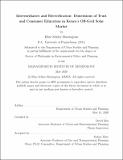| dc.contributor.advisor | David Hsu. | en_US |
| dc.contributor.author | Harrington, Elise Schley. | en_US |
| dc.contributor.other | Massachusetts Institute of Technology. Department of Urban Studies and Planning. | en_US |
| dc.coverage.spatial | f-ke--- | en_US |
| dc.date.accessioned | 2020-09-15T22:06:16Z | |
| dc.date.available | 2020-09-15T22:06:16Z | |
| dc.date.copyright | 2020 | en_US |
| dc.date.issued | 2020 | en_US |
| dc.identifier.uri | https://hdl.handle.net/1721.1/127615 | |
| dc.description | Thesis: Ph. D., Massachusetts Institute of Technology, Department of Urban Studies and Planning, May, 2020 | en_US |
| dc.description | Cataloged from the official PDF of thesis. | en_US |
| dc.description | Includes bibliographical references (pages 247-266). | en_US |
| dc.description.abstract | Countries still working towards universal energy access are beginning to utilize a range of renewable energy technologies and services to meet rural electrification goals. Stemming from mobile money innovations in Kenya, "pay-as-you-go" off-grid solar increases the short term affordability of small-scale solar solutions for rural households. Consumer experiences with off-grid solar vary across distribution models based on the local actors responsible for engaging with end-users. I call these on-the-ground actors frontline solar intermediaries and they link consumers and providers through in person interactions and have the ability to perform different acts of intermediation in designed solar distribution models. Frontline solar intermediaries are not only important for making off-grid solar sales, but for implementing consumer safeguards (e.g. quality assurance and consumer protections). | en_US |
| dc.description.abstract | Based on fieldwork in Kenya, I identify four types of frontline solar intermediaries: community influencers, networking solar agents, embedded entrepreneurs, and group leaders. I use a conjoint survey experiment to test the influence of social capital and reputation on an intermediary's trustworthiness. I find that trust stems from more than just initial social capital and may be enhanced by strategic partnerships or collaborations between NGOs, government, and private solar providers. Using a second original survey, I examine the effect of intermediary type on consumer knowledge. I find that relying on solar agents for help with solar issues is associated with an 11% higher expected knowledge count and a 23% increase in seeking help to solve problems. Solar agents are the most common frontline solar intermediary in Kenya and remain a key source of information and assistance for after-sales services. | en_US |
| dc.description.abstract | The incentives, interpersonal relationships, and training programs that influence frontline solar intermediary behavior suggest that these local actors are critical to building off-grid solar as a lasting complement (or in some cases, alternative) to the centralized grid. | en_US |
| dc.description.statementofresponsibility | by Elise Schley Harrington. | en_US |
| dc.format.extent | 266 pages | en_US |
| dc.language.iso | eng | en_US |
| dc.publisher | Massachusetts Institute of Technology | en_US |
| dc.rights | MIT theses may be protected by copyright. Please reuse MIT thesis content according to the MIT Libraries Permissions Policy, which is available through the URL provided. | en_US |
| dc.rights.uri | http://dspace.mit.edu/handle/1721.1/7582 | en_US |
| dc.subject | Urban Studies and Planning. | en_US |
| dc.title | Intermediaries and electrification : dimensions of trust and consumer education in Kenya's off-grid solar market | en_US |
| dc.type | Thesis | en_US |
| dc.description.degree | Ph. D. | en_US |
| dc.contributor.department | Massachusetts Institute of Technology. Department of Urban Studies and Planning | en_US |
| dc.identifier.oclc | 1193557141 | en_US |
| dc.description.collection | Ph.D. Massachusetts Institute of Technology, Department of Urban Studies and Planning | en_US |
| dspace.imported | 2020-09-15T22:06:16Z | en_US |
| mit.thesis.degree | Doctoral | en_US |
| mit.thesis.department | UrbStud | en_US |
